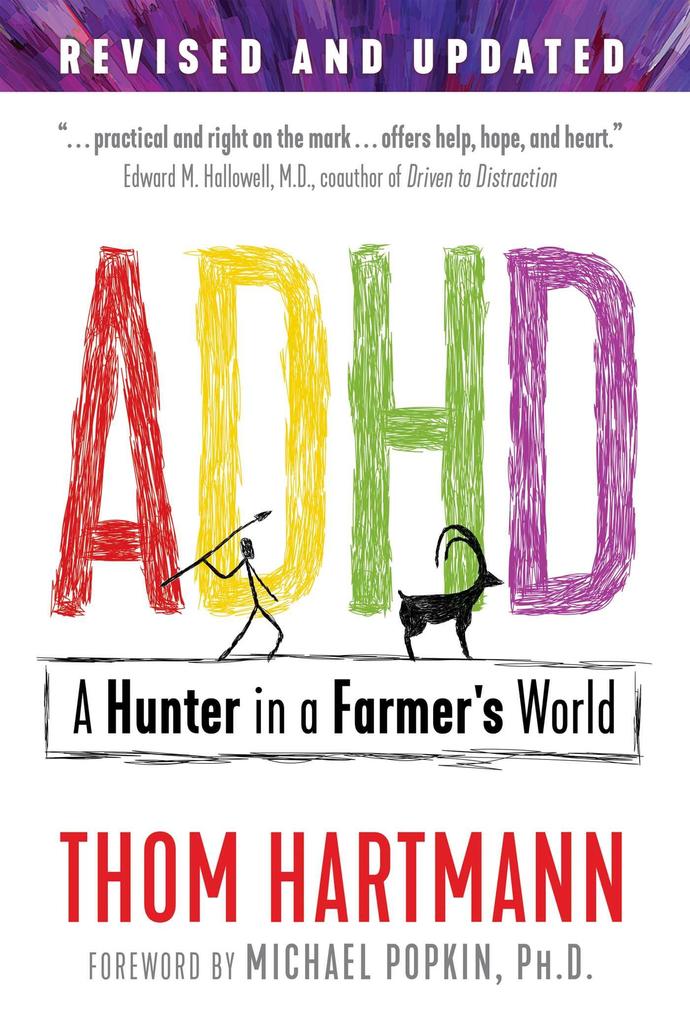A newly revised and updated edition of the classic guide to reframing our view of ADHD and embracing its benefits
• Explains that people with ADHD are not disordered or dysfunctional, but simply "hunters in a farmer's world"--possessing a unique mental skill set that would have allowed them to thrive in a hunter-gatherer society
• Offers concrete non-drug methods and practices to help hunters--and their parents, teachers, and managers--embrace their differences, nurture creativity, and find success in school, at work, and at home
• Reveals how some of the world's most successful people can be labeled as ADHD hunters, including Benjamin Franklin, Thomas Edison, and Andrew Carnegie
With 10 percent of the Western world's children suspected of having Attention Deficit Disorder, or ADHD, and a growing number of adults self-diagnosing after decades of struggle, the question must be raised: How could Nature make such a "mistake"?
In this updated edition of his groundbreaking classic, Thom Hartmann explains that people with ADHD are not abnormal, disordered, or dysfunctional, but simply "hunters in a farmer's world." Often highly creative and single-minded in pursuit of a self-chosen goal, those with ADHD symptoms possess a unique mental skill set that would have allowed them to thrive in a hunter-gatherer society. As hunters, they would have been constantly scanning their environment, looking for food or threats (distractibility); they'd have to act without hesitation (impulsivity); and they'd have to love the high-stimulation and risk-filled environment of the hunting field. With our structured public schools, office workplaces, and factories those who inherit a surplus of "hunter skills" are often left frustrated in a world that doesn't understand or support them.
As Hartmann shows, by reframing our view of ADHD, we can begin to see it not as a disorder, but as simply a difference and, in some ways, an advantage. He reveals how some of the world's most successful people can be labeled as ADHD hunters and offers concrete non-drug methods and practices to help hunters--and their parents, teachers, and managers--embrace their differences, nurture creativity, and find success in school, at work, and at home. Providing a supportive "survival" guide to help fine tune your natural skill set, rather than suppress it, Hartmann shows that each mind--whether hunter, farmer, or somewhere in between--has value and great potential waiting to be tapped.
Inhaltsverzeichnis
FOREWORD
Re-affirming the Value of All Human Beings by Michael Popkin
PREFACE
From Minimal Brain Damage to Hyperactivity to ADHD
INTRODUCTION
Hunters and Farmers Twenty Years Later
PART ONE
UNDERSTANDING HUNTERS AND FARMERS
ONE
ADHD as a State of Mind
TWO
How to Recognize Attention Deficit Hyperactivity Disorder
THREE
Hunters in Our Schools and Offices: The Origin of ADHD
FOUR
"Normal" People: The Origins of Agriculture
FIVE
Baseline States of Consciousness
SIX
Could Someone with ADHD Have Survivedin a Primitive Hunting Society?
SEVEN
Hunters and Farmers Vindicated by Science
EIGHT
What Maslow Overlooked: The Need to Feel Alive
NINE
Can Parents' Smoking Cause Childhood Behavior Problems?
PART TWO
LIVING AND THRIVING IN THE FARMER'S WORLD
TEN
How to Turn a "Disorder" Back into a Skill: A Survival Guide for ADHD Adults
ELEVEN
The Hunter's Struggle: Impulse and Its Control
TWELVE
How to Work with a Hunter: Practical Advice for Managers, Parents, and Teachers
THIRTEEN
Studying and Paying Attention
FOURTEEN
Creativity and ADHD: A Brilliant and Flexible Mind
FIFTEEN
ADHD and Sleep
SIXTEEN
Hunters on Drugs
SEVENTEEN
Halfway to the Stars:How Unrealized ADHD Can Limit an Apparently Successful Life
EIGHTEEN
A Disorganized Collection of "Hunter in a Farmer's World" Anecdotes
NINETEEN
The Edison Trait: Hunters Who Have Changed the World
EPILOGUE
Older and Younger Cultures: Further Thoughts on Cultural Anthropology and Our Future Acknowledgments
AFTERWORD
A Legacy of Hope
by Ellen B. Littman
About the Author
by Dave deBronkart
Also by Thom Hartmann
Bibliography
Index




































